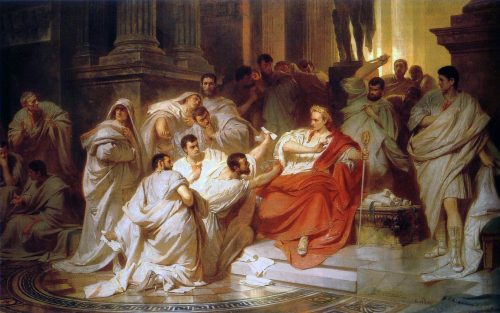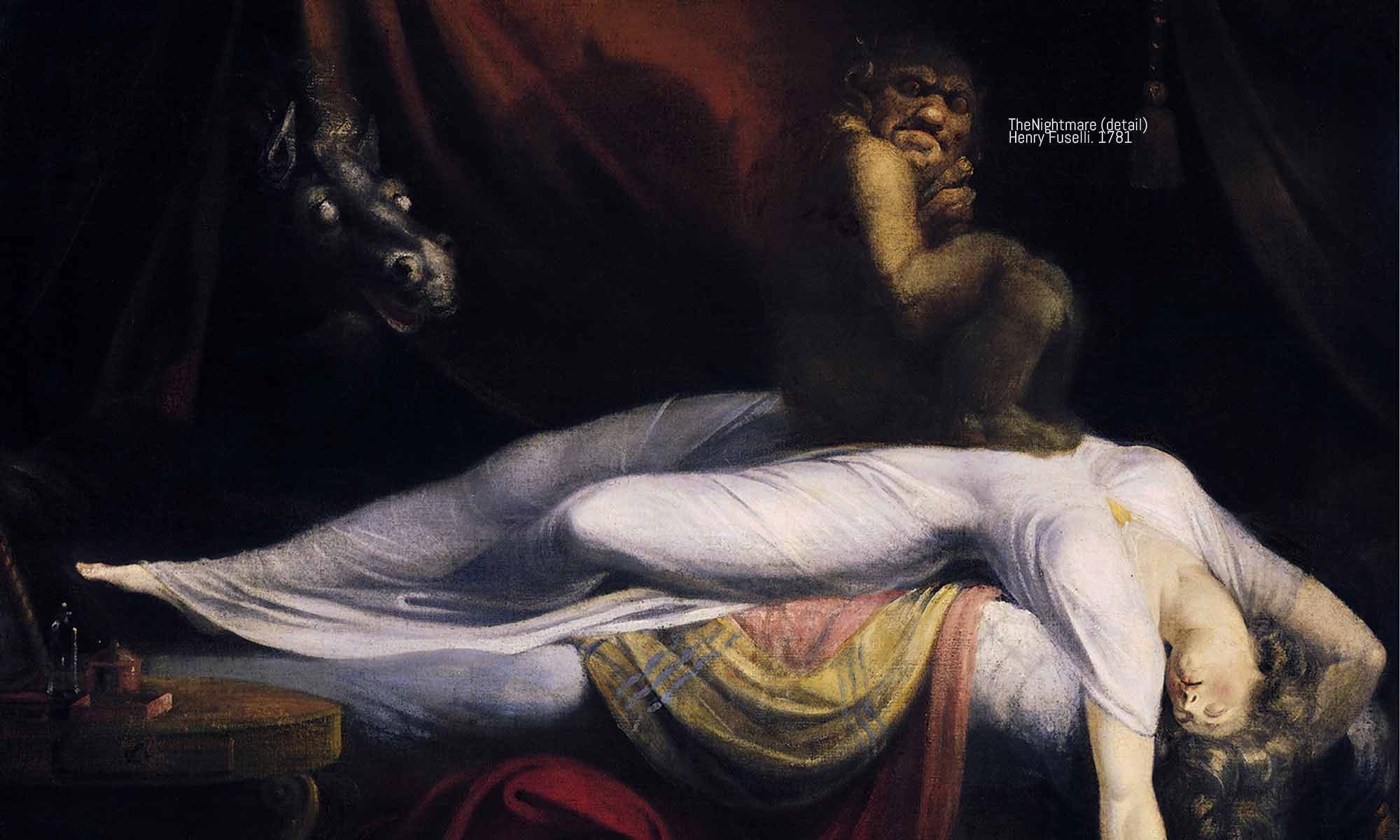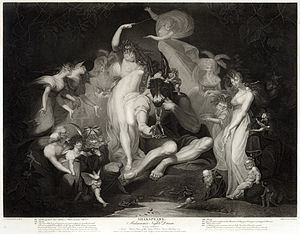 Prophetic dreams of doom go unheeded in Shakespeare’s tragedy about violent political strife among the greatest leaders of ancient Rome.
Prophetic dreams of doom go unheeded in Shakespeare’s tragedy about violent political strife among the greatest leaders of ancient Rome.
In Julius Caesar, strange dreams and nightmares join with other frightening portents to besiege the people of Rome from all sides. Terrible storms, weird avian behavior, and a haunting Soothsayer add to the pervasive sense of inescapable doom pressing down on the city. The very foundations of the world, both political and cosmic, are cracking apart. Forces of chaos have been set loose within the empire. And yet, not a single one of Rome’s political leaders has the visionary capacity to recognize the signs of danger. For their failures to heed these warnings, they pay with their lives.
The great Caesar himself sets the tone in an early scene, when the Soothsayer gives him an unmistakable warning: “Beware the Ides of March.” Caesar is the first character to make the grievous mistake of dismissing as trivial something that turns out to be a vital truth. For the supreme leader of the Roman empire, the reason for rejecting the Soothsayer boils down to one word: he is a dreamer. To be a dreamer, then, is to have nothing of significance to say to the ruling authority. But as the play later reveals, it is the dreamer who had the most significant message of all for the ruler. This complex polarity of dreaming and political power recurs throughout this play, and in many of Shakespeare’s other plays as well.
Though named after Caesar, the play focuses more attention on Brutus, the popular Roman senator who faces an awful moral choice: Should he stay loyal to his long-time friend and comrade-in-arms, who has shown no evidence of tyrannical tendencies? Or should he defend the city and people he loves from the imminent threat of a dictator seizing total control of their government? The agony of making a decision has disrupted his sleep, to the point where nightmarish feelings and images begin seeping into his waking mind, threatening his mental balance.
His sleep-deprived condition makes Brutus easy prey for the deception of Cassius, who fabricates the letter from the people of Rome urging Brutus to take charge of the rebellion against Caesar. Brutus muses over the line about needing to “awake.” What he really needs is to sleep, yet the letter urges him (metaphorically) to do the opposite. By taking the letter at its face value, Brutus compounds his mistake—accepting something as true that is in fact the opposite.
The most powerful prophetic dream in Julius Caesar is also the one that receives the most egregiously mistaken interpretation. The dream occurs to Calphurnia, Caesar’s wife, one of the only female characters in the play. She does not narrate the dream herself; her husband tells it for her. He relates that she cried out three times in her sleep about his murder, then woke up and told him about a dream of a statue with blood pouring out from all sides. This is almost exactly what happens to Caesar later that day, and at first he accepts the dream’s warning and plans on protecting himself at home rather than going out.
But Decius has been sent by the conspirators for the exact reason of luring Caesar out of his palace and escorting him to the Senate, when they will lie in wait, knives at the ready. Calphurnia’s dream poses a direct obstacle to their plan, so Decius must quickly devise an alternative reading of the dream, one that calms Caesar’s fears and persuades him to lower his guard. Using a combination of fawning flattery and rank misogyny, Decius leads Caesar away from the dream’s true meaning and toward a false interpretation that actually facilitates the fatal fulfillment of the prophecy.
Immediately after this debate over the proper interpretation of Calphurnia’s dream, the next scene opens with the reading of a letter by a character named Artemidorus of Cidnos, a well-regarded teacher who finds out about the assassination plot. His letter contains a true account of the plot, and if he had succeeded in giving it to Caesar, it would have saved the ruler’s life. But as with all the other portents of impending doom, Caesar ignored this one, too, and Artemidorus calls for the ruler’s attention in vain. The character of Artemidorus of Cidnos may have had a historical source, but at least some of the people in Shakespeare’s audience would also have associated him with Artemidorus of Daldis, another famous Roman teacher who wrote the Oneirocritica, the most influential manual of dream interpretation for many centuries. The Oneirocritica was well-known in Shakespeare’s time, and most of the popular dream interpretation manuals available to the public were based on the system of Artemidorus of Daldis. Perhaps it is just a coincidence that a scene with a failure to properly interpret an important dream about Caesar is followed by a scene in which a character named Artemidorus fails to convey an important message to Caesar. But some of the audience, and maybe Shakespeare himself, would have followed a connecting thematic thread through these scenes, and many other as well, about the dangers of missing a warning of dangers in dreaming.
The murder of Caesar sets loose a similar dynamic in the streets of Rome. A young poet, Cinna, awakens with a dream of feasting with Caesar, and like Caesar he hesitates in setting foot out of the house that morning because of the ill omen. But some irresistible force compels him to go forth, where he encounters a mob of people inflamed by Marc Antony’s speech against Brutus and the other assassins. The mob confuses Cinna the poet with another man named Cinna who helped the conspiracy against Caesar. Even though the young poet tells the angry people of their mistake, they violently attack him anyway. The madness of the vengeful crowd dispenses with the need to distinguish truth from illusion.
In the bloody battles for power that follow Caesar’s murder, the forces of Brutus are soon pushed to the brink of defeat. Brutus senses his time has come because the ghost of Caesar appears to him in a quasi-dream state, terrifying him with the presentiment of his own impending death. When the ghost departs, Brutus awakens Lucius and asks if he has been dreaming and cried out; Lucius confusedly says no, and Brutus struggles to process the uncanny reality of what he has just experienced. His epistemological uncertainty signals the further dissolution of his capacity to keep his waking and sleeping states from blurring into each other.
When the end comes, Brutus welcomes it as a long-desired rest. Only now does he clearly foresee his future. He conscripts the last of his friends, the slumbering Strato, to awaken and help ease him into an eternal slumber.
Contemporary performances:
The amazing production of Julius Caesar I saw at the Oregon Shakespeare Festival in February, directed by Shana Cooper, had a setting so abstract and desaturated it could have been anywhere, or everywhere. Untethered to any specific time period, it explored the dark psychological dynamics of male aggression, vanity, and ambition. The bloody choreography of masculine violence overshadowed the fine speeches about political virtue. By the end of the play all the physical structures on stage had been torn to pieces and cast to the ground. Tyranny had been averted, but at the cost of chaos.
Two casting choices made this production especially powerful. First, Brutus was played by Danforth Comins, who performed as Hamlet in last year’s OSF production of that play. Like Hamlet, Brutus agonizes over existential questions of duty, justice, and personal loyalty, and Comins gave the character a tremendous depth of consciousness, especially during his scenes of sleepless brooding. Second, the part of the Soothsayer was played by Brooklyn Williams, a 12-year old girl who wore a sleeveless green dress. This was a brilliant move, jarring to audience expectations perhaps, but unforgettably effective in showing that true wisdom, and even a hint of future growth, may come from the most improbable of sources.
References to sleep and dreams in the play:
I.2.29
Julius Caesar waves away the Soothsayer (who has just told Caesar, “Beware the Ides of March”): “He is a dreamer. Let us leave him. Pass.”
I.2.203
Caesar says he prefers to be surrounded by agreeable men who are “fat, sleek-headed,” “such as sleep a-nights.”
II.1.4
Brutus tries to awaken his sleeping assistant Lucius, whose deep slumber he envies: “I would it were my fault to sleep so soundly.”
II.1.48, 50
Brutus opens a letter supposedly sent to him from the people of Rome, encouraging him to lead the rebellion: “Brutus, thou sleep’st. Awake, and see thyself!” He then repeats this line to himself.
II.1.64, 68
The stress of the conspiracy against Caesar has taken its toll on Brutus: “Since Cassius first did whet me against Caesar, I have not slept.” Brutus goes on to describe his agonized mental state as something “like a phantasma or a hideous dream.”
II.1.214
Cassius tells the other conspirators that Caesar has become more superstitious recently, a change from his previously skeptical views “of fantasy, of dreams, and ceremonies.”
II.1.248-252
Brutus finds Lucius asleep again, and praises the youth for his innocence: “Thou hast no figures nor no fantasies/Which busy care draws in the brains of men”
II.2.1-3
At night during a terrible storm, Caesar comes out of his bedroom and says “Thrice hath Calphurnia in her sleep cried out/’Help ho, they murder Caesar!’”
II.2.80-4
Caesar says he will stay home today because of the warning vision seen by his wife in her sleep: “She dreamt tonight she saw my statue,/Which, like a fountain with an hundred spouts,/Did run pure blood; and many lusty Romans/Came smiling and did bathe their hands in it.”
II.2.88-111
Decius, one of the conspirators, persuades Caesar that Calphurnia’s dream actually has a more favorable meaning: “This dream is all amiss interpreted./It was a vision fair and fortunate./Your statue spouting blood in many pipes,/In which so many smiling Romans bathed,/Signifies that from you great Rome shall suck/Reviving blood, and that great men shall press/For tinctures, stains, relics, and cognizance./This by Calphurnia’s dream is signified.” Caesar is more pleased by the interpretation of Decius (“And this way you have well expounded it”) than by his wife’s (“How foolish do your fears seem now, Calphurnia!/I am ashamed I did yield to them”).
II.3.1
Artemidorus of Cidnos reads a letter of warning that he plans to deliver directly to Caesar.
III.3.1-4
Cinna the poet goes out in the streets despite having just had an unsettling dream: “I dreamt tonight that I did feast with Caesar;/And things unluckily charge my fantasy.” Moments later he is attacked by a mob who mistakes him for one of the conspirators.
IV.3.286
Brutus invites his comrades to rest before the next day’s battle: “I pray you, sirs, lie in my tent and sleep.”
IV.3.318-323
After Lucius and the others fall asleep and the candle burns low, Brutus sees the ghost of Caesar: “Ha, who comes here?—/I think it is the weakness of mine eyes/That shapes this monstrous apparition./It comes upon me.—Art thou any thing?/Art thou some god, some angel, or some devil,/That mak’st my blood cold and my hair to stare?”
IV.3.333-350
Deeply startled, Brutus wakes everyone up and asks if they saw anything: “Didst thou dream, Lucius, that thou so criedst out?”
V.5.1
Facing the end, Brutus says to his weary comrades: “Come, poor remains of friends, rest on this rock.”
V.5.20-3
Brutus says he knows his “hour has come” because he has seen the ghost of Caesar “two several times by night.”
V.5.36-46
Brutus bids farewell to his friends, even one who has fallen asleep on the rock: “Strato, thou hast been all this while asleep,/Farewell to thee, too, Strato.” By this point he welcomes death: “Night hangs upon my eyes; my bones would rest,/That have but labored to attain this hour.” A moment later, his other friends run away. Strato awakens, and holds the sword by which Brutus kills himself.
Updated notes:
Here’s an article by Mary Beard in The New Statesman about the unintended political consequences of the assassination of Julius Caesar.



 A dream researcher friend asked if knew anything about the role of dreams in Shakespeare’s romantic comedy “A Midsummer Night’s Dream,” since she could not find any good info on the web. Here’s my response, which she suggested I post:
A dream researcher friend asked if knew anything about the role of dreams in Shakespeare’s romantic comedy “A Midsummer Night’s Dream,” since she could not find any good info on the web. Here’s my response, which she suggested I post: